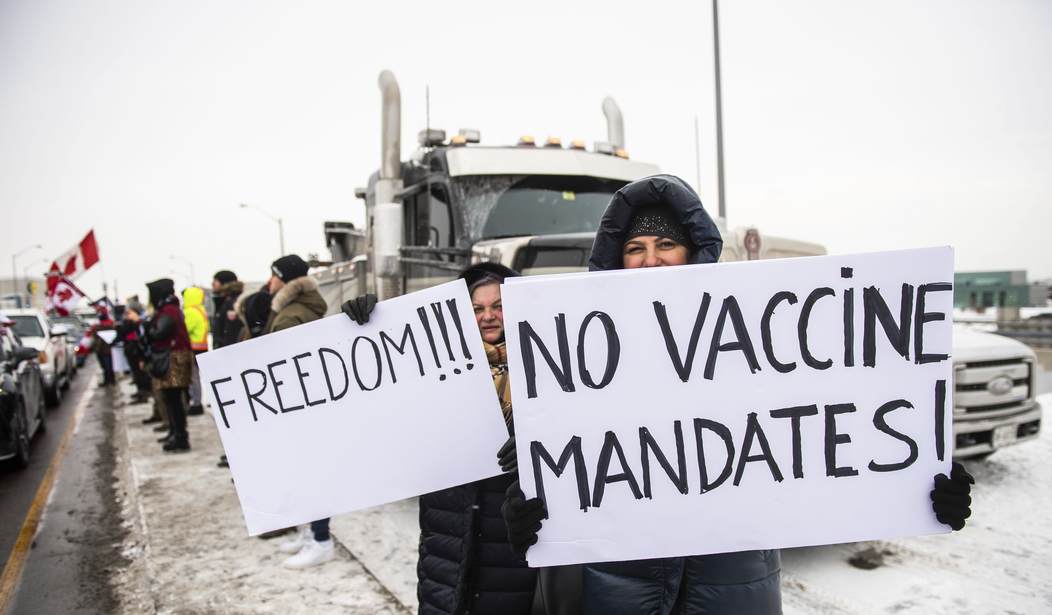Well this is a pleasant surprise! The good guys won one.
BREAKING: The counter-terrorism law used by Justin Trudeau's government to arrest leaders of the Freedom Convoy and search and seize property and persons involved in the anti-mandate demonstration, was deemed unconstitutional by a judge.
MORE: https://t.co/4Kss1TJS47 pic.twitter.com/RxZWMftUmV
— Rebel News (@RebelNewsOnline) January 23, 2024
A very brief recap of what was at issue: During anti-mandate Trucker’s convoy, PM Justin Trudeau invoked an Act that had been put in place giving the government extraordinary powers under very limited circumstances. It was written in order to give Canada’s government the ability to deal with terrorists and was never intended to be used as a tool to suppress the free speech rights of Canadians.
You can read some of our coverage here, here, and here.
Despite sympathizing greatly with the truckers, I could argue that their takeover of Toronto Ottowa clearly went beyond free expression, as it essentially shut down the city, and was intended to pressure the government using soft coercion. In response, PM Trudeau used extraordinary forms of coercion, both physical and financial, and he was able to do so based on the very questionable claim that the truckers were engaged in terrorism.
It was more like Woodstock than anything similar to terrorism. It was hardly Antifa. Children were in bouncy castles.
Trudeau’s methods were extremely controversial, and rightly so. He used the anti-terrorism powers to seize money, debank protesters, and seize property.
Trudeau essentially militarized the situation, using counterterror tactics. Ironically, the massive deployment of excessive state power against the Truckers Convoy reinforced their point: Trudeau was abusing power to get what he wanted.
Unsurprisingly, Trudeau faced enormous criticism for using these tactics, and with the protest broken up, the question of the legality of those tactics took center stage.
A required Public Order Emergency Commission (POEC) met to determine whether Trudeau exceeded his powers and determined that he didn’t. This was hardly shocking since governments rarely criticize themselves or move to limit their power.
But the story didn’t end there: it went to the courts, and finally, a victory was had.
Federal Judge Richard Mosley just released his decision in the case, and it was a surprise:
370] At the outset of these proceedings, while I had not reached a decision on any of the four applications, I was leaning to the view that the decision to invoke the EA was reasonable. I considered the events that occurred in Ottawa and other locations in January and February 2022 went beyond legitimate protest and reflected an unacceptable breakdown of public order. I had and continue to have considerable sympathy for those in government who were confronted with this situation. Had I been at their tables at that time, I may have agreed that it was necessary to invoke the Act. And I acknowledge that in conducting judicial review of that decision, I am revisiting that time with the benefit of hindsight and a more extensive record of the facts and law than that which was before the GIC.
[371] My preliminary view of the reasonableness of the decision may have prevailed following the hearing due to excellent advocacy on the part of counsel for the Attorney General of Canada had I not taken the time to carefully deliberate about the evidence and submissions, particularly those of the CCLA and CCF. Their participation in these proceedings has demonstrated again the value of public interest litigants. Especially in presenting informed legal argument. This case may not have turned out the way it has without their involvement, as the private interest litigants were not as capable of marshalling the evidence and argument in support of their applications.
[372] I have concluded that the decision to issue the Proclamation does not bear the hallmarks of reasonableness – justification, transparency and intelligibility – and was not justified in relation to the relevant factual and legal constraints that were required to be taken into consideration. In my view, there can be only one reasonable interpretation of EA sections 3 and 17 and paragraph 2(c) of the CSIS Act and the Applicants have established that the legal constraints on the discretion of the GIC to declare a public order emergency were not satisfied.
The decision was enormous–stretching to 126 pages–so I skipped to the end in order to get the news out. Forgive me if I am just scratching the surface on the details.
This is a big deal. It is the first formal acknowledgment that the Canadian government’s power is limited when confronted by dissenters. It is one thing to use prudent measures to ensure public order–and as much as I hate to acknowledge it, the truckers were clearly violating the law–in a good cause, but civil disobedience requires a willingness to accept consequences for your actions.
But Trudeau basically shredded the Charter in order to get what he wanted. He seized property without due process. He treated dissenters like terrorists, just as his mandates stripped people of their basic rights to bodily autonomy.
In both cases, the government was the aggressor. It is good to see they lost.







Join the conversation as a VIP Member